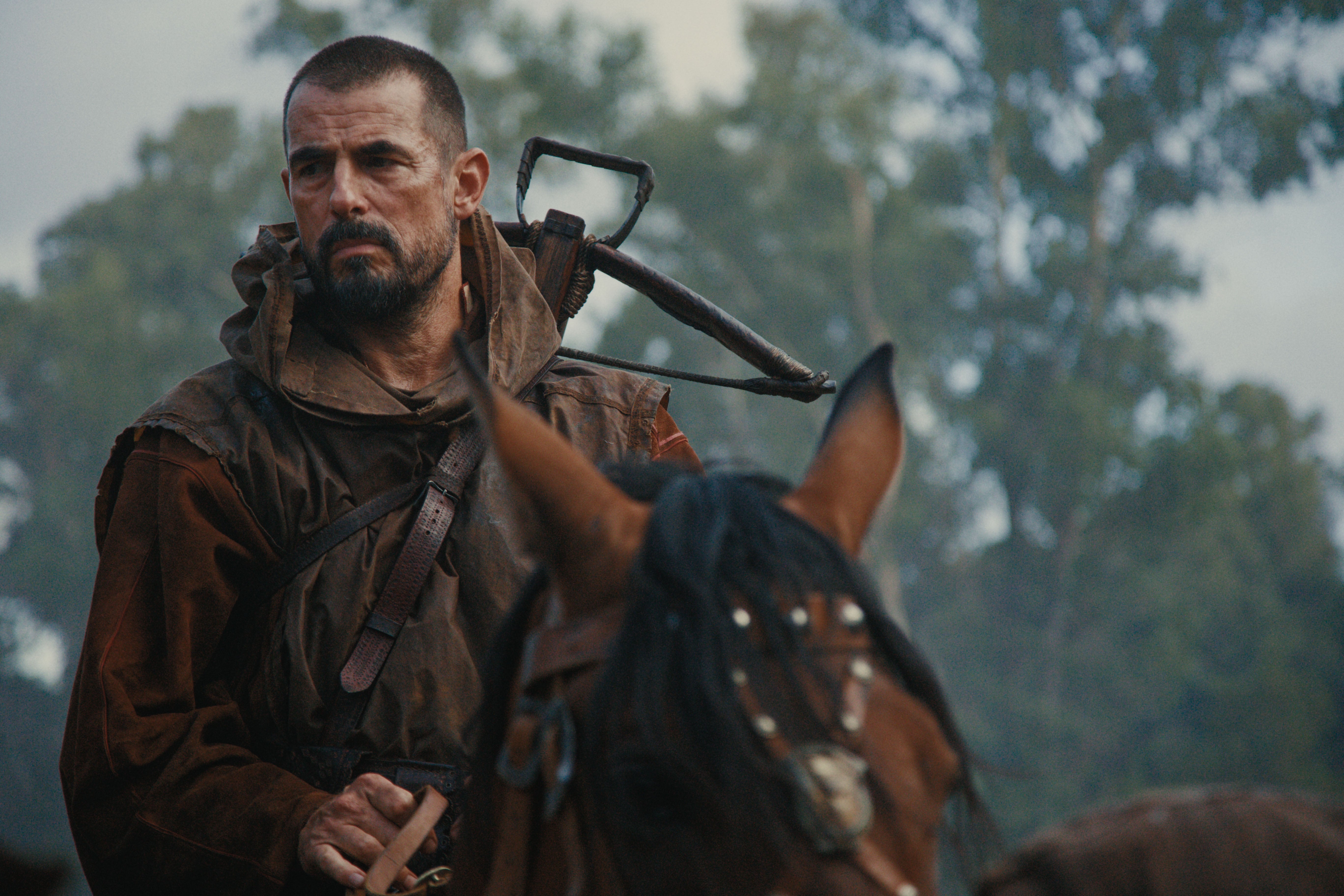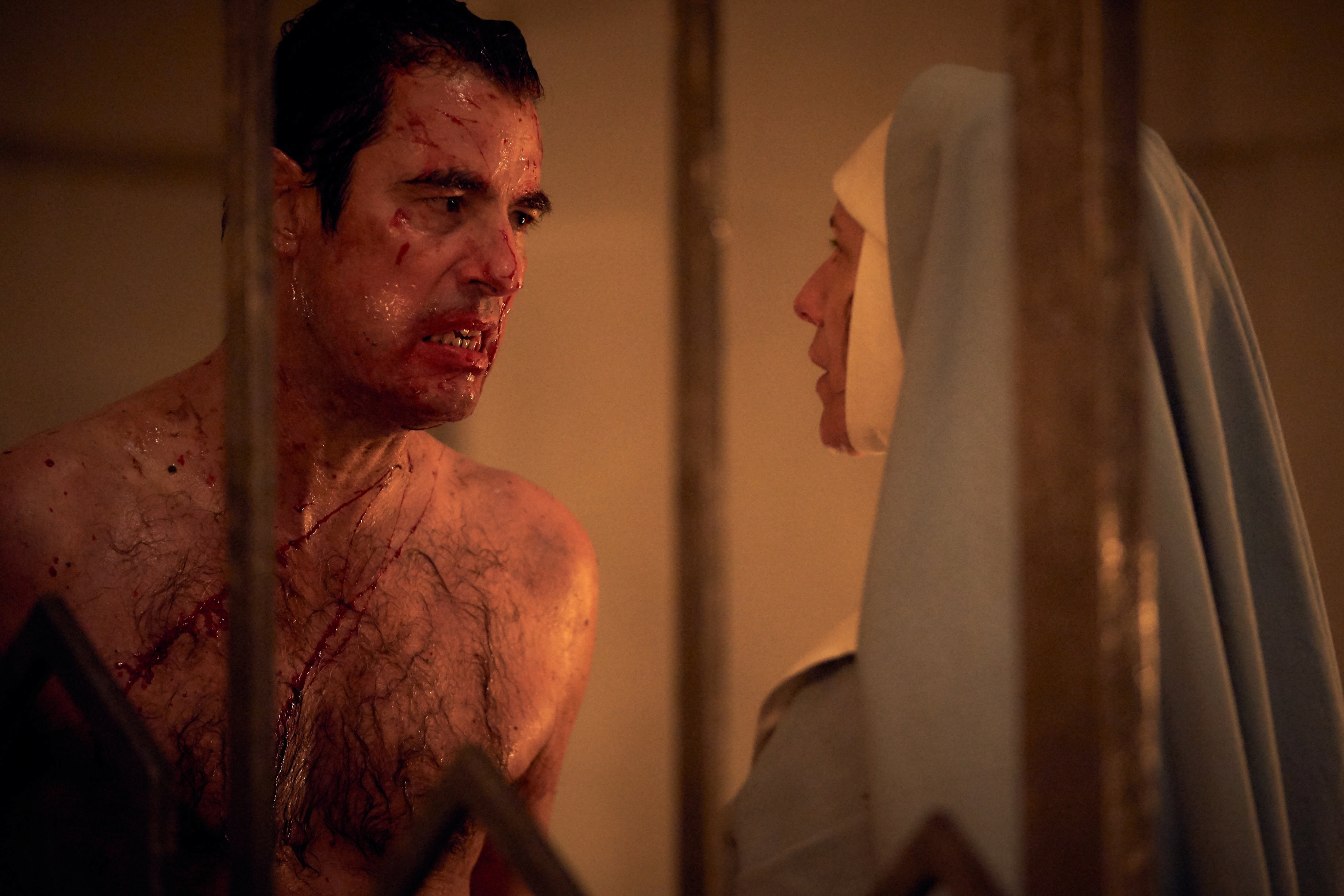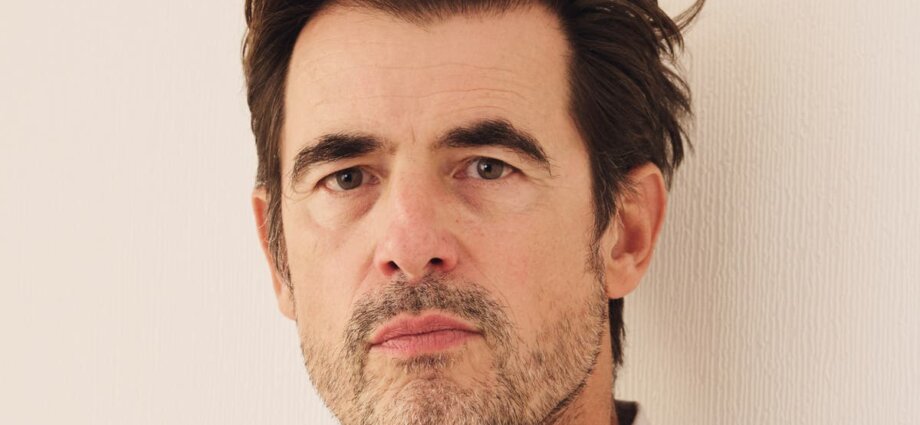If you read enough interviews with Claes Bang, the sturdy Danish star of The Northman and BBC One’s Dracula , you will start to notice a pattern. Interviewers won’t stop mentioning nude scenes. Then again, Claes Bang can’t seem to stop doing them. “I’ve done three plays with a lot of nudity,” he admits, including most recently Jeremy O Harris’s Daddy on the West End. “In Dracula, there was a lot. Plus there have been your odd sex scenes here and there. I have a friend back home, who said, ‘Are you ever considering doing something where you get to keep your clothes on?’ I was like, ‘What the f*** are you talking about?’ That’s when I started to think, ‘No more. We’re done with that.’ But I just did a movie in Paris, [L’Inconnu de la grande arche, expected sometime this year] and in the very first bloody scene, I’m stood in a lake, fishing… naked!”
The 57-year-old actor sits – fully clothed – behind a table in a central London hotel cafe. Nearly 6ft 5in, and wearing a plush, muted sweater, Bang feels almost too big for the furniture. It’s no wonder he made such a rakish Count, in 2020’s revisionist Dracula miniseries; a kind of easy erudition seems to waft out of him. You’d have to be confident, I suppose, to whip your kit off so prolifically, as Bang did in Dracula, for a lengthy nude scene in which he rampages through a convent of nuns. “[Naked] is just what we all are,” he muses. “I mean we’re all with no clothes, underneath our clothes. Right? But there’s always been an artistic reason for the nudity. It’s not something I do because I think it’s massively funny.”
No one outside of mainland Europe had really heard of Bang until 2017. That was the year he starred in The Square (2017), as a problematic and self-absorbed art curator. The satire, directed by Triangle of Sadness’s Ruben Östlund, went on to win the Palme d’Or at Cannes, and transformed Bang from a jobbing character actor with a few hits in Denmark and Germany to someone whom casting directors wanted for major English-language projects. Among them were the adaptation of Stieg Larsson’s thriller The Girl in the Spider’s Web, which cast Bang as a nefarious criminal, and Sharon Horgan’s black comedy Bad Sisters, which featured Bang at his most memorably repellent, playing the abusive husband of Anne-Marie Duff’s Grace.
“Acting is the only job I’ve ever had,” Bang says. “I had a quite decent career in Denmark – but obviously a big change happened for me with The Square.” By the time Östlund’s movie premiered, Bang was 50 – which makes his performance surely one of the oldest “breakthroughs” in recent memory. “When a film wins at Cannes, the whole industry sees it,” he says, rather matter-of-factly. “All of a sudden, there’s this guy, and he [speaks] decent English, and he can carry a movie for that amount of time. At that point, I already had 25 years of experience, so I had a feeling when I met people that I was bankable.”
He adds: “But I never imagined something like that would happen – that you could have one thing that would open all these doors for you.”
Behind the most recent of these doors is the historical thriller William Tell, released in cinemas this week. The film sees Bang play the Swiss folk hero opposite Rafe Spall and Ben Kingsley, and is performed in English despite its setting of 14th-century Switzerland. Adapted from the 1804 play by Friedrich Schiller, it focuses on the legend of ace marksman Tell (Bang), who leads the fight for Swiss independence against the Habsburg Empire. To play the character who so famously shot an arrow from atop his son’s head, Bang had to train extensively with a crossbow. “It’s illegal to own a crossbow in Denmark,” he says. “So I had to come here for the practice – we did that in Richmond.”
The actor describes it as an “old-fashioned movie” – the sort of classical period drama that used to abound in Hollywood, but now feels like a strange rarity. “It’s like how a movie would look in the 1950s,” he says. “You know, you have to stand up straight to deliver this kind of dialogue.”

Despite this, he adds, William Tell is a story with very contemporary resonance – an oppressed people seeking to liberate their country from invaders. And this wasn’t lost on the cast or creators. “You have to realise that when we started shooting this, the war in Ukraine was over a year old, and while we were shooting, the conflict with Israel and Hamas started,” he recalls. “You can’t make a movie like this – without thinking about how that sits in that context. You have to say something decent. It was always very important to [Northern Irish director Nick Hamm] to emphasise the magnitude of loss, and the meaninglessness of it.”
Born on the Danish island of Funen, Bang was raised predominantly by his father, his parents having separated when he was young. A school production of Hair piqued his interest in acting as a teen; this led to amateur theatre, and eventually a place at the Danish National School of Theatre. His national breakthrough came almost immediately after graduating, via a part in the popular Danish drama Taxa in 1997. Despite his career gravitating westward, Bang still lives in Copenhagen, with his wife, Lis Kasper Bang, a makeup artist turned photographer, and her two children, to whom Bang is a stepfather.

Watch Apple TV+ free for 7 days
New subscribers only. £8.99/mo. after free trial. Plan auto-renews until cancelled
Bang stares at me quite intensely as he speaks, cradling his face in his hands, his body turned at an angle. He speaks very, very quietly (nominative determinism be damned), with just a measure of Chardonnay-dry humour. It’s the same sort of prickly geniality that he weaponised so cleverly in The Square. Bang excels at roles that involve a sort of complicated suaveness. There’s a reason he’s had to field questions about being cast as the next James Bond, just as there’s a reason why it would never happen – there’s too much softness about him, a fallibility to his charm that can read as pathetic (as in The Square) or noble (as in William Tell).
In the UK, Bang’s most recognisable role is the sickly-suave lead of Mark Gatiss and Steven Moffat’s Dracula. But the project almost passed him by. “I remember the first thing I thought when they approached me was, ‘Really? Another Dracula?’” he recalls. “Then I read the script, which had a totally different dynamic to every other Dracula… and there was humour as well.

“Then after [I signed on], I got terrified. I thought, ‘Why have I gotten myself into this? It can only ever go wrong because there are so many aficionados out there. We’ll murder ourselves here – it’s suicide!’ But then in the end I’m very, very happy with it.”
One thing that has helped Bang’s belated mainstream success is, of course, his deft command of English – and German, and Swedish – on top of his native Danish. “As I said, I finished a movie in Paris last week,” he says, “and half the dialogue was in French. And I don’t speak French, so I had to learn it phonetically. But then you’re locked in – I didn’t know how much of a prison that can be. I had to say to the other actors, ‘I’m so awfully sorry, but you bloody need to stick to what is written, or I won’t get the cues.’”
Bang’s voice has barely changed over the course of the interview, even when conversation turns again to nude scenes, specifically to the matter of intimacy coordinators (trained hands on film and TV sets tasked with ensuring the comfort and consent of actors during intimate scenes). While they are now commonplace on set – a shift that Bang has witnessed over the course of his career – they remain a somewhat divisive idea among actors.

There was, says Bang, a German film production he signed onto a while ago (he refuses to name it), which featured several scenes of Bang’s character visiting a sex worker at a brothel. “I thought it was a really interesting project,” he remembers – but problems arose over the matter of intimacy coordinators. “I was talking with the director,” he continues, “and he asked, ‘So what do you think about all [the sex scenes]?’ I said, ‘We’ve got intimacy coordinators these days, we’re going to be fine.’ He said, ‘No, no, we’re not going to have that. That’s going to stand in the way of my creativity.’ And I said, ‘Then I’m sorry. I can’t do this.’ And that was the end of that.”
The incident might tell you something about Bang – the flinty conviction lurking under that tranquil exterior. “I definitely feel that [intimacy coordinators] provide a safe space,” he continues. “They provide a room that you did not have before, where you can talk about these things, and make sure that everybody feels alright.
“You shouldn’t go to a film set or on stage and feel violated – it’s not going to do anything good for the production. So I really feel they’ve been a massive and good change for the industry.”
If anyone’s qualified to speak on the matter of sex scenes, it’s surely Claes Bang. Maybe nominative determinism has had its way after all.
‘William Tell’ is out in UK cinemas from 17 January











